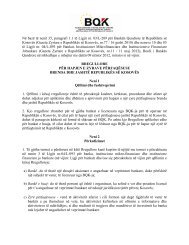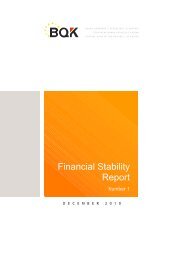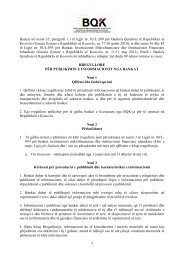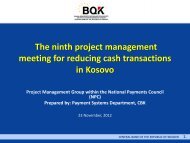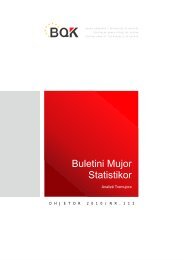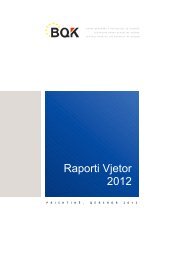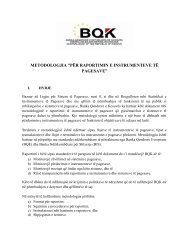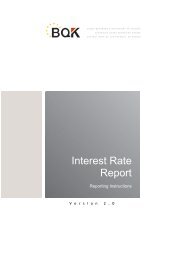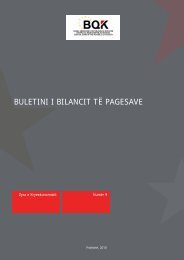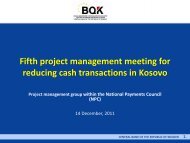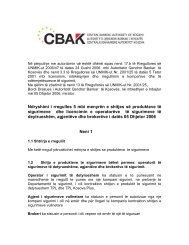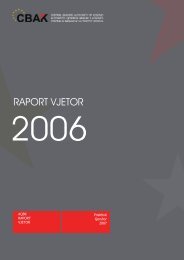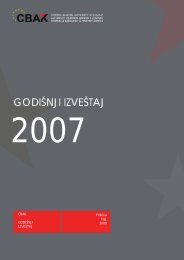financial stability report - Banka Qendrore e Republikës së Kosovës
financial stability report - Banka Qendrore e Republikës së Kosovës
financial stability report - Banka Qendrore e Republikës së Kosovës
Create successful ePaper yourself
Turn your PDF publications into a flip-book with our unique Google optimized e-Paper software.
Number 3<br />
Financial Stability Report<br />
9. Identifying Systemically Important Banks in Kosovo<br />
Albulenë Kastrati* 19<br />
Abstract<br />
This article elaborates the concept of the systemic risk in the <strong>financial</strong> sector, giving<br />
emphasis on a relatively new concept in the finance literature, that of systemically<br />
important <strong>financial</strong> institutions (SIFIs). The importance of the debate on SIFIs lies in the<br />
fact that these institutions are essential for the smooth functioning of the <strong>financial</strong> sector,<br />
but also their breakdown or bankruptcy poses serious threat to the <strong>financial</strong> and<br />
macroeconomic <strong>stability</strong>. In order to provide a more comprehensive overview, this article<br />
includes a model for identifying systemically important banks (SIB) in the <strong>financial</strong> sector<br />
of Kosovo, which bases on the three criteria, namely, size, substitutability and<br />
interconnectedness. The main findings of this analysis are that the three largest banks in<br />
Kosovo clearly have systemic importance in all of the considered criteria; three biggest<br />
banks, two other smaller banks are also considered as systemically important in the<br />
substitutability criterion; whereas, besides having a negligible level of inter-bank<br />
correlations, three largest banks in Kosovo results as systemically important.<br />
9.1. Introduction<br />
During the <strong>financial</strong> crises, <strong>financial</strong> institutions are more fragile to shocks and crises<br />
(Bernanke and Gertler, 1989) and may easily cause severe implications in the whole<br />
economy. The <strong>financial</strong> crisis that commenced in 2007/2008 serves as an example where the<br />
failure of the individual institutions helped spreading the shocks across the <strong>financial</strong><br />
system and proclaimed the crisis into the real sector. Therefore, a key policy lesson from the<br />
recent <strong>financial</strong> crisis has been the need to put a greater emphasis on securing <strong>financial</strong><br />
market <strong>stability</strong>, by paying special attention to the systemic risk (Tarashev et al., 2010). In<br />
effect, the global <strong>financial</strong> crisis induced a large amount of the rethinking of the previous<br />
<strong>financial</strong> regulatory frameworks (such as Basel II) and motivated reforms in regulating<br />
<strong>financial</strong> institutions, particularly the large and interconnected institutions. This is<br />
because, these particular <strong>financial</strong> institutions are significantly important for the wellfunctioning<br />
of the <strong>financial</strong> sector as well as other sectors in the economy, and likewise may<br />
pose serious consequences for the system and the economy. An emerging literature names<br />
these institutions as systemically important <strong>financial</strong> institutions (SIFIs).<br />
The original idea on the systemic risk is relatively old in the literature, dating back more<br />
than twenty years ago. However, in terms of policymaking, the concept of SIFIs is relatively<br />
new, and to the best of our knowledge, it emerged no earlier than in 2009.<br />
The purpose of this paper is to analyse the systemic importance in the banking system of<br />
Kosovo and to draw attention on the <strong>financial</strong> and economic costs inferred if the wellfunctioning<br />
of these institutions is disturbed. We will also present an analytical framework<br />
and the criteria used as instruments to identify SIFIs in the banking system of Kosovo. The<br />
*Albulenë Kastrati is Economist at the Financial Stability and Economic Analysis Department in the CBK. Views expressed in this article are the Authors’ and<br />
do not necessarily express the official views of the Central Bank of the Republic of Kosovo.<br />
82 |



